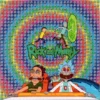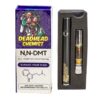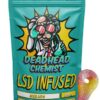What is Ibogaine
Are you tired of waking up feeling unfulfilled after a night of restless sleep? Imagine entering a world where you have complete control over your dreams, where anything is possible.
Welcome to the realm of lucid dreaming, a state in which you become aware that you are dreaming and can actively participate in and shape the dream experience.
While lucid dreaming may seem like a far-fetched concept, there is a natural plant medicine that has been gaining attention for its potential to unlock this incredible ability: Iboga.
Have you ever wished you could control your dreams, explore fantastical worlds and experience unimaginable adventures? If so, then you’re not alone. Lucid dreaming, the ability to become aware and take control of your dreams, has fascinated people for centuries.
Now there’s a powerful ally in unlocking the full potential of your dream world: Iboga.
Derived from the root bark of the Iboga tree found in Central Africa, Iboga has been used for centuries in traditional ceremonies and rituals.
In recent years, it has captured the interest of dream enthusiasts and researchers alike, who believe that it holds the key to enhancing the dream world.
In this article, we will explore the fascinating connection between Iboga and lucid dreaming, and how this powerful plant medicine can help you unlock the full potential of your dream world.
Get ready to embark on an extraordinary journey into the realm of lucid dreaming like never before.
Ibogaine is a psychoactive alkaloid that is derived from the root bark of the Iboga tree, native to Central Africa. It has been used by indigenous cultures for centuries in rites of passage, spiritual ceremonies, and healing rituals.
In recent years, Ibogaine has gained attention for its potential as a treatment for various conditions, including addiction, depression, and post-traumatic stress disorder (PTSD).
The chemical structure of Ibogaine is similar to that of serotonin, a neurotransmitter responsible for regulating mood, sleep, and appetite.
This similarity allows Ibogaine to interact with serotonin receptors in the brain, leading to profound effects on consciousness and perception. It is believed that Ibogaine’s ability to enhance self-awareness and introspection is what makes it particularly effective in unlocking lucid dreaming.
Ibogaine is typically consumed in the form of a powder or capsule, and the dosage can vary depending on individual factors such as body weight, tolerance, and desired effects.
More so, it is important to note that Ibogaine is a potent substance and should be used with caution. It is recommended to seek guidance from a qualified practitioner or shaman experienced in working with Ibogaine before embarking on a lucid dreaming journey.
What is Lucid Dreaming
Lucid dreaming is the ability to become aware that you are dreaming while you are still in the dream state. In a lucid dream, the dreamer is able to consciously control and manipulate the events and outcomes of the dream.
This can range from simply observing the dream as it unfolds to actively participating and shaping the dream world according to one’s desires.
Lucid dreaming has been a topic of interest and study for centuries, with references to it found in ancient texts and folklore from various cultures.
In recent years, advancements in neuroscience and sleep research have shed light on the mechanisms behind lucid dreaming and its potential benefits.
During a typical dream, the brain is in a state of heightened activity, with the prefrontal cortex, the part of the brain responsible for rational thinking and self-awareness, being less active. In a lucid dream, however, the prefrontal cortex becomes more active, allowing the dreamer to maintain a sense of self-awareness and volition within the dream.
Lucid dreaming offers a unique opportunity for exploration and self-discovery. It allows individuals to tap into their subconscious mind, confront fears and anxieties, and even practice new skills or rehearse challenging situations. Lucid dreaming has also been linked to improved problem-solving abilities, creativity, and overall well-being.
Benefits of Lucid Dreaming
The benefits of lucid dreaming extend beyond the realm of entertainment and wish fulfillment. Research has shown that lucid dreaming can have a positive impact on various aspects of life, including personal growth, mental health, and even physical well-being.
One of the most significant benefits of lucid dreaming is the opportunity for self-exploration and personal growth. In a lucid dream, individuals can confront their fears, work through unresolved emotions, and gain insights into their subconscious mind.
This can be particularly helpful for those struggling with anxiety, depression, or trauma, as it provides a safe and controlled environment for processing and healing.
Lucid dreaming has also been found to improve problem-solving skills and creativity.
By actively engaging with the dream world and manipulating its elements, individuals can tap into their subconscious creativity and find innovative solutions to real-life challenges.
Lucid dreaming has been used by artists, writers, and inventors as a source of inspiration and a means of overcoming creative blocks.
In terms of physical well-being, lucid dreaming has been associated with improved sleep quality and reduced nightmares. By actively participating in the dream and influencing its content, individuals can create more positive and peaceful dream experiences. This can have a direct impact on sleep patterns and overall sleep satisfaction.
Iboga and Lucid Dreaming
Now that we have a better understanding of Ibogaine and lucid dreaming, let’s explore how Iboga can enhance and facilitate lucid dream experiences.
Iboga is known for its ability to induce a deep state of introspection and self-awareness. When consumed, Iboga activates certain areas of the brain that are responsible for self-reflection and introspection, allowing individuals to gain insights into their thoughts, emotions, and behaviors.
This heightened state of self-awareness can be particularly beneficial for those interested in exploring the dream world and unlocking lucid dreaming.
The psychoactive properties of Iboga can also enhance the vividness and clarity of dreams. Many users report experiencing more vivid and lifelike dreams after consuming Iboga, making it easier to recognize and become aware of the dream state. This heightened level of awareness can serve as a trigger for lucid dreaming, allowing individuals to take control of their dreams and shape them according to their desires.
Furthermore, Iboga has the potential to enhance dream recall. Dream recall refers to the ability to remember and recall the details of a dream after waking up. Iboga’s effects on the brain’s memory systems can improve the ability to remember dreams, making it easier to document and analyze dream experiences.
Where to Buy Ibogaine
If you’re interested in exploring Ibogaine for lucid dreaming or other purposes, it’s important to find a reliable and reputable source. Due to its psychoactive nature, Ibogaine is a controlled substance in many countries, and its sale and distribution may be restricted or illegal.
However, there are still legal avenues to obtain Ibogaine for personal use.
One option is to seek out licensed clinics or retreat centers that offer Ibogaine-assisted therapy. These facilities typically provide a safe and supportive environment for individuals to explore the therapeutic potential of Ibogaine under the guidance of experienced practitioners. It is important to do thorough research and choose a reputable facility that adheres to safety protocols and ethical practices.
Another option is to connect with underground networks or online communities that specialize in sourcing and distributing Ibogaine. While this may be a riskier option, it can provide access to Ibogaine for those who are unable to travel or have limited resources. It is essential to exercise caution and ensure the quality and purity of the Ibogaine obtained from these sources.
Ibogaine Reviews and Testimonials
The experiences and testimonials of individuals who have used Ibogaine for lucid dreaming can provide valuable insights and guidance for those considering its use.
Nancy J: “I have been practicing lucid dreaming for several years, but after incorporating Ibogaine into my routine, my dream experiences have reached a whole new level. Not only are my dreams more vivid and immersive, but I can now effortlessly recognize when I am dreaming and take control of the dream. It’s like having a virtual reality playground inside my mind!”
Arthur: “Ibogaine has been a game-changer for me in terms of lucid dreaming. I used to struggle with maintaining lucidity and often woke up as soon as I became aware that I was dreaming. But with Ibogaine, I can stay in the dream state for longer periods and explore the dream world in incredible detail. It has opened up a whole new world of possibilities for me.”
Kiki: “I was skeptical at first, but after trying Ibogaine for lucid dreaming, I am a believer. The clarity and intensity of my dreams have skyrocketed, and I can now have lucid dreams almost every night. It has been a transformative experience, and I would highly recommend it to anyone interested in exploring the depths of their subconscious mind.”
Frequently Asked Questions about Ibogaine
Ibogaine is not recommended for everyone. It is important to consider individual factors such as medical history, current medications, and mental health conditions before using Ibogaine. It is advisable to consult with a healthcare professional or experienced practitioner before embarking on a lucid dreaming journey with Ibogaine.
**Q: Is Ibogaine safe?**
A: While Ibogaine has shown promising therapeutic potential, it is important to approach it with caution. Ibogaine can have profound effects on consciousness and should only be used under the guidance of experienced practitioners in a safe and controlled environment.
**Q: Can anyone use Ibogaine for lucid dreaming?**
A: Ibogaine is not recommended for everyone. It is important to consider individual factors such as medical history, current medications, and mental health conditions before using Ibogaine. It is advisable to consult with a healthcare professional or experienced practitioner before embarking on a lucid dreaming journey with Ibogaine.
**Q: Are there any side effects of Ibogaine?**
A: Ibogaine can have various side effects, including nausea, vomiting, dizziness, and changes in blood pressure. These effects are usually temporary and subside as the substance is metabolized by the body. However, it is essential to be aware of potential risks and monitor one’s well-being during and after Ibogaine use.
**Q: Can Ibogaine be used as a substitute for professional therapy?**
A: Ibogaine can be a powerful tool for self-exploration and personal growth, but it is not a substitute for professional therapy. It is important to approach Ibogaine with realistic expectations and supplement its use with other therapeutic modalities if needed.
Alternatives to Ibogaine (Ayahuasca)
While Ibogaine is a potent and effective tool for lucid dreaming, it may not be accessible or suitable for everyone. Fortunately, there are other plant medicines and substances that can also enhance dream experiences and facilitate lucid dreaming. One such alternative is Ayahuasca.
Ayahuasca is a traditional plant medicine used by indigenous cultures in the Amazon region for spiritual and healing purposes. It is a combination of two plants: the ayahuasca vine (Banisteriopsis caapi) and the leaves of the chacruna plant (Psychotria viridis).
Ayahuasca ceremonies, often facilitated by experienced shamans, provide a powerful setting for exploring the dream world and unlocking lucid dreaming.
Similar to Ibogaine, Ayahuasca can enhance self-awareness and introspection, making it easier to recognize and control dream states. It can also provide valuable insights and guidance for personal growth and healing.
However, it is important to note that Ayahuasca is a potent psychoactive substance and should only be used under the guidance of experienced practitioners in a safe and supportive environment.
The Legality of Psychedelics
The legal status of psychedelics, including Ibogaine and Ayahuasca, varies from country to country. In some places, these substances are classified as controlled substances and their sale, possession, and use may be illegal or heavily regulated.
However, there are also countries and regions where psychedelics are legally available for religious or therapeutic purposes.
It is important to research and understand the legal framework surrounding psychedelics in your specific location before considering their use.
Engaging in illegal activities can have serious consequences and jeopardize your safety and well-being. If you are unable to access psychedelics legally, it is advisable to explore other legal and safe alternatives for enhancing dream experiences and lucid dreaming.
In conclusion, Ibogaine offers a fascinating avenue for unlocking lucid dreaming and exploring the depths of the dream world.
Its profound effects on self-awareness, dream clarity, and dream recall make it a powerful tool for seasoned lucid dreamers and those interested in delving into the realm of controlled dreaming.
However, it is essential to approach Ibogaine with caution, seek guidance from experienced practitioners, and adhere to legal and ethical considerations.
Whether you choose Ibogaine or explore alternatives such as Ayahuasca, the world of lucid dreaming awaits, ready to be unlocked and experienced like never before.






